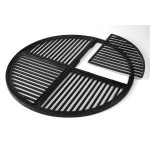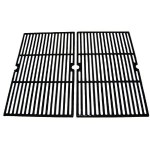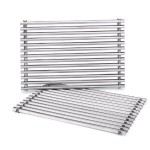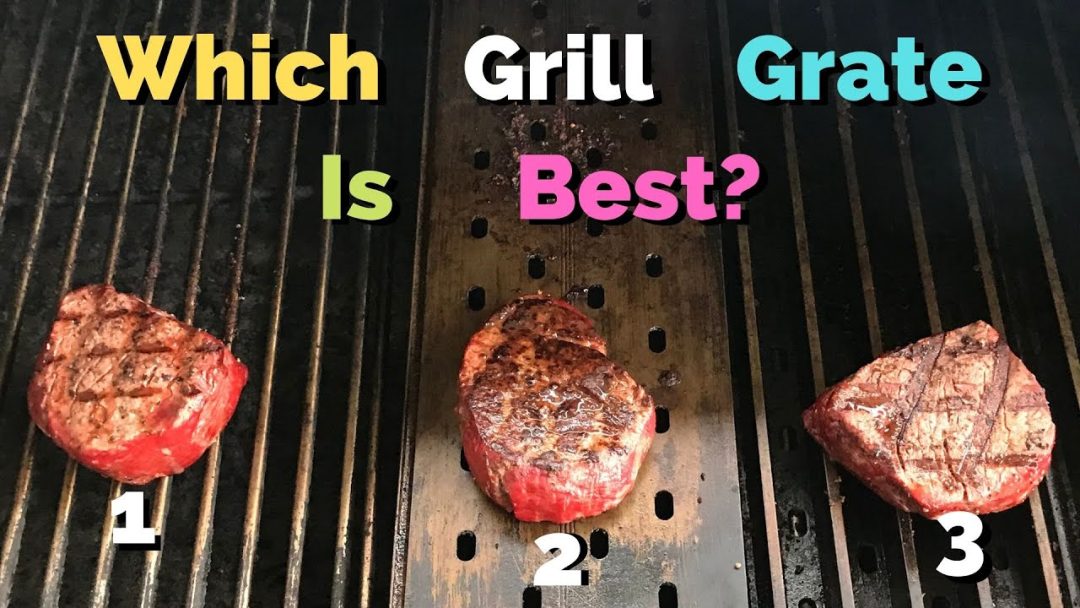If you have ever been shopping for barbecue grills, you will quickly find that there is a variety of grill grates available. Grill grates are those bars or wires that run across your grill and keep your meat and vegetables from falling into the actual flame or burning coals.
In this post, I want to look at the different types of grates and point out the differences. With adequate information, you should then be able to make an educated decision as to which type of barbecue grill grate you prefer.
Grill grates usually fall into 4 categories
- Cast iron grates
- Porcelain-coated cast-iron grates
- Stainless steel grates
- Porcelain-coated steel grates
Which cooking grate you use will depend a lot upon what you prefer, what type of outdoor cooking you usually do, and possibly upon which grate comes with the grill. In many cases, if you do not prefer the grate that ships with the grill you can purchase a different type.
Let us take a look at these 4 types of grill grates in more detail.
What about the cast iron grate and is there an advantage?
With cast iron, there is considerably more weight and the grill bars are usually wider and closer together than with the stainless steel grates.
 Because of the greater density, cast iron grates will take a longer time to reach hot searing temperatures. However, once that temperature is reached, these grates will evenly distribute the heat and will retain the heat for a longer period of time, allowing cooking at much lower temperatures.
Because of the greater density, cast iron grates will take a longer time to reach hot searing temperatures. However, once that temperature is reached, these grates will evenly distribute the heat and will retain the heat for a longer period of time, allowing cooking at much lower temperatures.
Aside from the heavyweight of a cast iron grate, one other downside often stated is that it takes a bit of effort to maintain the grates. Cast iron grates must be seasoned initially as well as periodically to maintain its usability.
What about the porcelain-coated cast-iron grates?
These grates provide the wide bars that are placed close together, just like the bare cast-iron grates. The biggest difference between these and the bare grates is the manner of cleaning and maintaining.
 While the raw cast-iron grates need seasoning regularly, the porcelain-coated cast-iron grates do not require any special seasoning treatment. Porcelain-coated grates should be handled with care to prevent damage to the exterior coating. The grates should be removed and cleaned after each use with soap and hot water. Avoid using anything abrasive to clean the grate as this could damage the protective coating. For more thorough cleaning, you can soak them in a water and vinegar mixture.
While the raw cast-iron grates need seasoning regularly, the porcelain-coated cast-iron grates do not require any special seasoning treatment. Porcelain-coated grates should be handled with care to prevent damage to the exterior coating. The grates should be removed and cleaned after each use with soap and hot water. Avoid using anything abrasive to clean the grate as this could damage the protective coating. For more thorough cleaning, you can soak them in a water and vinegar mixture.
NOTE: The porcelain coating can start to flake off after several uses. In the event your grates begin to show signs of rust, brush with the steel grill brush such as the Char-Broil Brush Hawg Grill Brush and season the grates following the instructions for the raw cast-iron grates.
What about the stainless steel grates?
Stainless steel cooking grates are usually the most expensive and longest lasting of all cooking grates. These will usually have the longest warranty and maybe even a lifetime warranty.
 Stainless steel grates are usually thinner than cast iron grates and are more widely spaced. While these grates will produce a sear mark, it is not the sear mark one typically associates with great grilling.
Stainless steel grates are usually thinner than cast iron grates and are more widely spaced. While these grates will produce a sear mark, it is not the sear mark one typically associates with great grilling.
What the stainless steel grates have going for them is their ease of cleaning and maintenance. These grates do not have to be seasoned. When you fire up the grill, let it preheat to about 500 degrees prior to cooking. Hit the grates with a good brass grill brush dipped in water. When finished, coat with a cooking spray just before adding your meat. For a more complete cleaning, you can use an oven cleaner or if they fit, some folks have even placed them inside a self-cleaning oven.
Being stainless steel, it will just about take anything you can throw at it for cleaning.
What about the porcelain-coated steel grates?
As with the porcelain-coated cast iron grill grates, the outer coating on these grates will deteriorate and begin flaking off. Since the underlying steel will not respond to seasoning, if the flaking gets too bad, you will need to replace the grates.
Conclusion
In terms of longevity, the stainless steel grill grates have the longest warranty, followed by porcelain-coated cast iron, and porcelain-enameled steel coming in the third spot.
Coming in last for the length of warranty and supposedly for how long it might last is the bare cast iron barbecue grill grate. I suspect part of the reason for the shorter warranty is the fact that many people will not discipline themselves to properly maintain the seasoning ritual required.
If properly maintained, cast iron will last a lifetime and will provide many grilling seasons of non-stick cooking.
